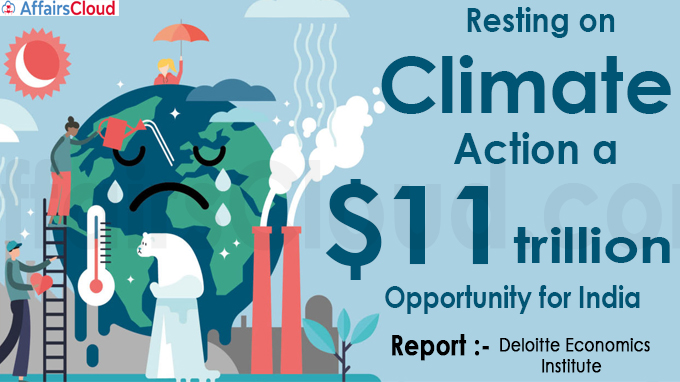 In accordance with the report titled ‘India’s turning point: How climate action can drive our economic future’ by Deloitte Economics Institute, India needs an action on climate change that could pave a way for $11 trillion economic gain, meanwhile, preventing a loss of $35 trillion over the next 50 years due to unmitigated climate change.
In accordance with the report titled ‘India’s turning point: How climate action can drive our economic future’ by Deloitte Economics Institute, India needs an action on climate change that could pave a way for $11 trillion economic gain, meanwhile, preventing a loss of $35 trillion over the next 50 years due to unmitigated climate change.
Key Points:
i.As per the report, there is a window time of 10 years which can be used by India as an opportunity to tackle the impacts of climate change. This can fetch a fruitful result of limiting rising average global temperatures to around 1.5°C by 2050.
- On the other hand, if no action is taken, the average global temperatures could rise by 3°C or more by the end of this century which will make it harder for people to live and work as there will be sea levels rise, fall of crop yields, damaged infrastructure, among others.
ii.In order to achieve the target of the US$5 Trillion economy by India, a sustainable economic growth is required which cannot be attained just by foreign and domestic investments but also through climate action. Following are the forecast by the report which shows how economic growth of industries will be affected by climate change impact:
- Over the next 50 years, the top 5 most impacted industries in terms of economic activity due to climate are services (government and private); manufacturing, retail and tourism; construction; and transport which currently account for more than 80 percent of India’s GDP (Gross Domestic product).
- By 2070, these five industries alone will experience an annual loss in the value added to GDP of more than US$1.5 trillion per year.
4 Key stages set by report for India
The report has sets out following four key stages for India’s climate transition which will led to a GDP growth of 8.5% in 2070:
i.Now and 2030– Government and businesses start acting on climate change so that the economy starts to decarbonize between now and 2030.
ii.From 2030 to 2040– Reduce carbon emissions by tackling how energy is produced and consumed.
iii.2040 to 2055– This will be a turning point. By this period, the process of decarbonising high-emission industries would be almost complete, the cost of green solutions would start to fall, and wider net economic gains would begin to emerge.
iv.After 2055– Indian economy would be producing near-zero emissions.
Recent Related News:
The ‘OECD-FAO Agricultural Outlook 2021-2030’ report released by OECD (Organisation for Economic Co-operation and Development) & UN’s FAO (Food & Agriculture Organization) states that the prices of Food commodities are set to become cheaper in 2021-30 and the global targets on reducing hunger and CO2 emissions are unlikely to be met under current policies.
About Deloitte:
It is a leading global provider of audit and assurance, consulting, financial advisory, risk advisory, tax, and related services.
Global Chief Executive Officer (CEO)– Punit Renjen




